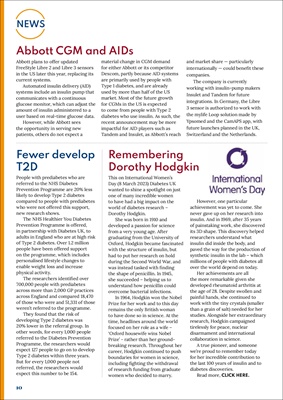
10
NEWS
Abbott CGM and AIDs
Abbott plans to offer updated
FreeStyle Libre 2 and Libre 3 sensors
in the US later this year, replacing its
current systems.
Automated insulin delivery (AID)
systems include an insulin pump that
communicates with a continuous
glucose monitor, which can adjust the
amount of insulin administered to a
user based on real-time glucose data.
However, while Abbott sees
the opportunity in serving new
patients, others do not expect a
material change in CGM demand
for either Abbott or its competitor
Dexcom, partly because AID systems
are primarily used by people with
Type 1 diabetes, and are already
used by more than half of the US
market. Most of the future growth
for CGMs in the US is expected
to come from people with Type 2
diabetes who use insulin. As such, the
recent announcement may be more
impactful for AID players such as
Tandem and Insulet, as Abbott's reach and market share - particularly
internationally - could benefit these
companies.
The company is currently
working with insulin-pump makers
Insulet and Tandem for future
integrations. In Germany, the Libre
3 sensor is authorized to work with
the mylife Loop solution made by
Ypsomed and the CamAPS app, with
future launches planned in the UK,
Switzerland and the Netherlands.
Fewer develop
T2D
People with prediabetes who are
referred to the NHS Diabetes
Prevention Programme are 20% less
likely to develop Type 2 diabetes
compared to people with prediabetes
who were not offered this support,
new research shows.
The NHS Healthier You Diabetes
Prevention Programme is offered,
in partnership with Diabetes UK, to
adults in England who are at high risk
of Type 2 diabetes. Over 1.2 million
people have been offered support
on the programme, which includes
personalised lifestyle changes to
enable weight loss and increase
physical activity.
The researchers identified over
700,000 people with prediabetes
across more than 2,000 GP practices
across England and compared 18,470
of those who were and 51,331 of those
weren't referred to the programme.
They found that the risk of
developing Type 2 diabetes was
20% lower in the referral group. In
other words, for every 1,000 people
referred to the Diabetes Prevention
Programme, the researchers would
expect 127 people to go on to develop
Type 2 diabetes within three years.
But for every 1,000 people not
referred, the researchers would
expect this number to be 154.
Remembering
Dorothy Hodgkin
This on International Women's
Day (8 March 2023) Diabetes UK
wanted to shine a spotlight on just
one of many incredible women
to have had a big impact on the
world of diabetes research -
Dorothy Hodgkin.
She was born in 1910 and
developed a passion for science
from a very young age. After
graduating from the University of
Oxford, Hodgkin became fascinated
with the structure of insulin, but
had to put her research on hold
during the Second World War, and
was instead tasked with finding
the shape of penicillin. In 1945,
she succeeded - helping us to
understand how penicillin could
overcome bacterial infections.
In 1964, Hodgkin won the Nobel
Prize for her work and to this day
remains the only British woman
to have done so in science. At the
time, headlines around the world
focused on her role as a wife -
'Oxford housewife wins Nobel
Prize' - rather than her groundbreaking
research. Throughout her
career, Hodgkin continued to push
boundaries for women in science,
including fighting the withdrawal
of research funding from graduate
women who decided to marry.
However, one particular
achievement was yet to come. She
never gave up on her research into
insulin. And in 1969, after 35 years
of painstaking work, she discovered
its 3D shape. This discovery helped
researchers understand what
insulin did inside the body, and
paved the way for the production of
synthetic insulin in the lab - which
millions of people with diabetes all
over the world depend on today.
Her achievements are all
the more remarkable given she
developed rheumatoid arthritis at
the age of 28. Despite swollen and
painful hands, she continued to
work with the tiny crystals (smaller
than a grain of salt) needed for her
studies. Alongside her extraordinary
research, Hodgkin campaigned
tirelessly for peace, nuclear
disarmament and international
collaboration in science.
A true pioneer, and someone
we're proud to remember today
for her incredible contribution to
the last 100 years of insulin and to
diabetes discoveries.
Read more, CLICK HERE.